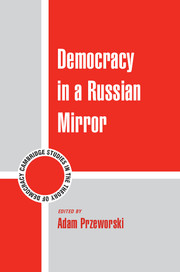Book contents
- Frontmatter
- Contents
- Contributors
- Introduction
- PART I RUSSIA
- PART II DEMOCRACY IN A RUSSIAN MIRROR
- 5 Judging Democracy as Form of Government for Given Territories: Utopia or Apologetics?
- 6 Democracy: Ancient and Modern, Good and Bad
- 7 The Role of Elections in Democracy
- 8 Elections and the Challenge of More Democracy
- 9 Democracy between Elections
- 10 General Settings, Regional and National Factors, and the Concept of Non-Western Democracy
- 11 “Non-Western Democracy” in the West
- PART III PATHS OF POLITICAL CHANGE
- Afterword: Open Issues and Disagreements
- References
- Name Index
- Subject Index
10 - General Settings, Regional and National Factors, and the Concept of Non-Western Democracy
from PART II - DEMOCRACY IN A RUSSIAN MIRROR
Published online by Cambridge University Press: 05 June 2015
- Frontmatter
- Contents
- Contributors
- Introduction
- PART I RUSSIA
- PART II DEMOCRACY IN A RUSSIAN MIRROR
- 5 Judging Democracy as Form of Government for Given Territories: Utopia or Apologetics?
- 6 Democracy: Ancient and Modern, Good and Bad
- 7 The Role of Elections in Democracy
- 8 Elections and the Challenge of More Democracy
- 9 Democracy between Elections
- 10 General Settings, Regional and National Factors, and the Concept of Non-Western Democracy
- 11 “Non-Western Democracy” in the West
- PART III PATHS OF POLITICAL CHANGE
- Afterword: Open Issues and Disagreements
- References
- Name Index
- Subject Index
Summary
INTRODUCTION
The economic and political problems facing the modernizing countries of the non-Western world are not unique to any of them. Western countries have solved them earlier, albeit in their own ways and within their own time frames. However, the ways of solving these nonunique problems are in fact exclusive to each country because of regional as well as national factors, including the cultural dimension, subsumed by the West on its way to political modernization and development. Western countries have already traversed this path of economic and political modernization and transformation from traditional to industrial societies long ago and have now finished, or are on their way to finishing, their transition to postindustrial societies in which the cultural dimension plays a subordinate role. Some Asian countries have also managed to complete this transition. However, other countries have only begun moving in the direction of modernization, and some are not even able to do so as of yet. Hence there are different ways in which a country's social, economic, and political systems modernize – these can be successful, problematic, or unsuccessful – and the ultimate result is either the success or failure of the entire modernization process. Yet, success in development and/or economic modernization may or may not be equated with success in political modernization, although economic competitiveness does have a positive correlation with political competitiveness (Downs 1957; Gerschenkron 1962; Frank 1998; Benhabib and Przeworski 2006). Therefore countries trying to catch up with the leaders in their field have modernized their economies as well as their politics, with the most successful creating a specific model of a competitive market economy within a competitive democratic political regime which is, as I will argue, of an individual type but within universally accepted rules. The recent rise of the non-Western world before and during the global financial crisis has raised the question of de-Westernization (Mahbubani 2008; Zakaria 2009), where the cultural/historical/civilizational parameter is probably the most important one for determining the type of market, political system, and regime that the given state will take on (Pye and Verba 1965; Geertz 1973; Colson 1974; Pye 1985; Wang Gungwu 1979; Inglehart and Welzel 2005; Zakaria 2009; Calichman and Kim 2010).
- Type
- Chapter
- Information
- Democracy in a Russian Mirror , pp. 184 - 211Publisher: Cambridge University PressPrint publication year: 2015
- 3
- Cited by

